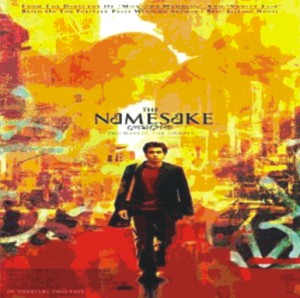Movie Review
 A Movie about the Burden of Regret
Sajid Huq
 In The Namesake, director Mira Nair and old friend and screenwriter Sooni Taraporevala, have successfully stepped outside the hackneyed traditions of moviemaking for the Diaspora. These are the traditions that cater only to Desi Americans and reinvent the wheel with the singular trope of being "born confused." In The Namesake, director Mira Nair and old friend and screenwriter Sooni Taraporevala, have successfully stepped outside the hackneyed traditions of moviemaking for the Diaspora. These are the traditions that cater only to Desi Americans and reinvent the wheel with the singular trope of being "born confused."
Nair's is a more American movie while at the same time being a tale of the immigrant experience. And more impressively, she manages to do this, without straying too far from Jhumpa Lahiri's popular novel, by the same name.
The story revolves around a young Bangali couple who migrate to America and raise a family. Ashima (Tabu) is a marriageable Bangali teenager who delights in English literature and takes an immediate liking to her desh-visiting suitor from America, Ashoke Ganguli (Ifran Khan). The couple marry and relocate to the US, as Ashima struggles with the alien weather, technologies, and etiquette (sometimes the lack thereof).
An important backdrop to this, before Ashoke and Ashima marry, are a fateful train conversation and a subsequent accident which configure a relationship between Ashoke and the Russian writer Gogol, whom he loves to read.
 On the train, while a young Ashoke is buried in the pages of Gogol's Overcoat, he is interrupted by another Bangali passenger who inspires him to travel to America and see the world. Overcoat was also the book on whose pages the flashlight of rescue workers shone, as Ashoke lay buried one more time, deep in the debris of the train after it crashed disastrously. Gogol's Overcoat not only saved Ashoke's life but allowed the next few chapters of it to unfold. On the train, while a young Ashoke is buried in the pages of Gogol's Overcoat, he is interrupted by another Bangali passenger who inspires him to travel to America and see the world. Overcoat was also the book on whose pages the flashlight of rescue workers shone, as Ashoke lay buried one more time, deep in the debris of the train after it crashed disastrously. Gogol's Overcoat not only saved Ashoke's life but allowed the next few chapters of it to unfold.
Soon, Ashoke and Ashima give birth to a son and a daughter. Kal Penn, unfailingly charismatic, grows up as Gogol Ganguli. He is blissfully unaware of his parent's mountains and seas of sacrifice; not to mention the significance of the name "Gogol." Awkward in his teens, skin, name and Diasporic outsiderness, Gogol becomes "Nikhil" and eventually "Nick."
Nick goes to Yale, and soon against the Desi grain in becoming an architect, eventually locating himself in white Americana and the love of a wealthy and affectionate blond woman. Nick grows increasingly closer to his girlfriend's parents, who epitomise the American family he desired but never had, while losing touch with his own Indian one.
An anxious Ashima tries to connect with Nikhil, tirelessly but unsuccessfully, only to realise that her son has moved on to bigger and better things. The empty-nest syndrome and the individuality of Americanised realities cast a perpetual gloom over her that threatens to engulf the audience. Slowly but surely, Ashima and Ashoke age. But in the midst of this gloom, their love continues unabated while always being understated.
The on-screen chemistry between the duo is rather masterful, thanks in part to Irfan's near-perfect rendition of the enlightened, soft-spoken, professorial father and husband. Ashoke puts his family before himself, and secretly etches his many sacrifices, always endorsing his family's various whims and decisions.
The crowd in Angelika Theater, New York City, gasped just as Nick does on screen, upon receiving the news of his father's passing away. He rushes to see his father's dead body, and embarks on a journey of burdensome nostalgia and overwhelming regret. The monumentality of his family's sacrifices dawn on him gradually yet unrelentingly, and Nick unplugs himself from his escapism.
As Nick and his girlfriend grow apart, enters his life a Bangali woman, Moushumi Mazumdar (Zuleikha Robinson). Francophile to the bone, sultry, seductive and playful, Moshumi charms Nick. A whirlwind romance ensues that culminates in a big Bangali wedding. However, Moushumi's past of romantic adventurousness returns in the form of a "Pierre," a French lover. Being Bangali isn't enough to make a marriage work, opines Zuleikha while breaking the news of her paramour to Nick. Nick tells her he never married her because she was Bangali.
Overall, Penn does well. As does Tabu. Both their characters are very well-developed. Tabu delivers a characteristically strong performance. Although I felt she was better as a clueless immigrant housewife who struggles with the alienness of her world than as a lonely mother. Penn impresses with his versatility, finally outgrowing his goofball typecast. He switches well from playing an awkward teenager to suave architect comfortable in white high culture, and finally to a more mature, culturally, and ethically conscious man.
The backdrop of Bengal is quite prominent here, with allusions to the region's cultural richness. Everyone seems to enjoy reading or singing or dancing in Bengal, a stereotype that never tires of reinvention, for better or for worse.
It is never easy to cram a long novel into a movie, spanning 30-something years across two continents. Consequently, there are parts to the narrative that may appear a tad rushed. Nick's turnaround after his father Ashoke's death appears sudden and revolutionary. But there are perhaps small drawbacks in a movie that by and large, charms, delights and moves.
The Namesake is Nair's paean to South Asian and other immigrant families, parents and their great sacrifices. The movie is about identities as much as it is about immigration, integration, love and loss. It is about the short-sighted choices we make to make our lives comfortable, at the expense of others. It's a reminder of the taken-for-grantedness we may fall into towards our loved ones. And finally, it is about the burden of regret.
Another reviewer spoke of how the movie made the reviewer call his parents. I must say I felt very similarly, and I called home as soon as I got back.
The writer is a PhD candidate and Teaching Fellow at Columbia University.
Copyright (R) thedailystar.net 2007 |
